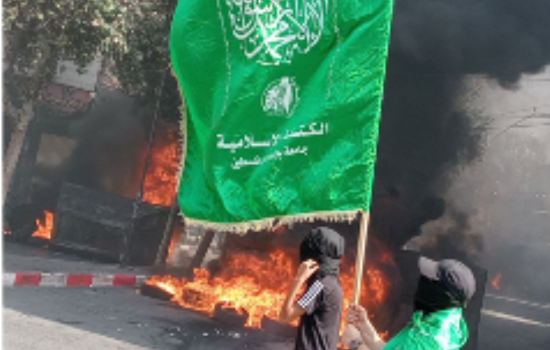Are the Palestinians Considering Biological Weapons?
An article appeared in the 13 August edition of the Lebanon-based Palestinian weekly, Al-Manar, stating that there is “serious thinking” among the Palestinians about obtaining biological weapons, according to a special dispatch by The Middle East Media Research Institute.
The Al-Manar article was signed by Taufiq Abu-Khosa, Deputy Chairman of The Palestinian Center for Information Sources-Gaza. MEMRI notes that The Palestinian Center for Information Sources in Gaza was directed by Jihad Al-Wazir, the son of Abu Jihad [former second in command for Yasser Arafat and head of PLO’s military forces].
| Following are excerpts from the article, titled “Will We Reach the Option of Biological Deterrence?” translated by The Middle East Media Research Institute (MEMRI):
“Due to the seriously uneven balance of power in the Israeli-Palestinian conflict, and in light of the escalation of the racist aggression, which elevates to the level of a war declaration, by the Sharon government… the Palestinian side is required to use weapons of deterrence that will even the balance of power, at least on the field.”
“While the human-bombs [meaning, suicide bombers] may be followed [and maybe stopped by] preventive measures…serious thinking has begun for a while about developing a Palestinian weapon of deterrence. This weapon terrifies the Israeli security apparatuses, from time to time, mainly because obtaining its primary components, whether biological or chemical, is possible without too much effort, let alone the fact that there are hundreds of experts who are capable of handling them and use them as weapons of deterrence, thus creating a balance of horror in the equation of the Palestinian-Israeli conflict.”
“A few bombs or death-carrying devices will be enough, once they are deployed in secluded areas and directed at the Israeli water resources or the Israeli beaches, let alone the markets and the residential centers. [This will be carried out] without explosions, noise, blood, or pictures that are used to serve the Israeli propaganda. Anyone who is capable, with complete self-control, of turning his body into shrapnel and scattered organs, is also capable of carrying a small device that cannot be traced and throw it in the targeted location.”
“What we want to say is that the Israeli security apparatuses take into account such dramatic development in the conflict, although they believe the issue is limited to the possibility of smuggling such weapons from abroad…”
“General Mofaz seeks a political future painted with Palestinian blood…without considering the level of casualties and economic damage that will be caused to the
Israeli society, if the Palestinian people and itsleadership are cornered.”
|
The Al-Manar article appears at first glance to be an attempt by Palestinian elements—or perhaps the Palestinian Authority itself—to threaten and deter Israel. Such a threat could be a consequence of the clear strategic inferiority of the Palestinian side, the growing number of terrorists arrested or killed by the Israeli security forces, and the relative success in preventing or minimizing the effects of the most recent suicide attacks.
The article, is in fact, the latest move in the psychological war against the Israeli people, who have proved much more resistant to the constant violence than Arafat expected when he first initiated hostilities.
It is likely that the Palestinian scheme is based on an analysis of the Israeli media coverage of an incident at the beginning of July, when parts of the National Water Carrier were found to be polluted with ammonia. This incident, which affected the Greater Tel Aviv-Jaffa area, was the worst case of pollution of the country’s drinking water since the late 1980’s, and the Health Ministry ordered residents of the central region to refrain from drinking tap water for 24 hours. There were no cases of people becoming sick as a result of incident, which was discovered to be the result of a technical error by the Mekorot Water Company.
As to the real threat posed by Palestinian use of biological weapons or materials, it should be stressed that until today there has been only one serious incident of biological attack in the whole history of terrorism. In September 1984, in the United States, the Rajneeshee, a religious cult attempted to manipulate the results of the local election in Wasco County, Oregon. The cult’s intention was to make enough people ill on election day, that their candidate would carry the election. To this end, they contaminated the salad bars of 10 local restaurants with salmonellosis. As a result 751 people became ill, but no one died.
It is no coincidence that as of the present, there have been practically no serious bio-terrorist attacks anywhere in the world. Specialists on the subject of non-conventional terrorism concur that the technical and operational problems in planning and organizing such an attack are nearly insurmountable. Among the difficulties, for instance, are the immediate threat to those dealing with biological agents themselves, as well as the intricate difficulties in the dissemination of the agents. Even the Japanese Aum Shinrikyo cult—which was the only organization to have perpetrated a successful chemical attack, when it unleashed sarin gas in the Tokyo underground in March 1995—decided very early to renounce its plans to use biological agents, precisely because of these difficulties and risks.
There have in the past been reported attempts by Palestinians to poison water sources or food in Israel, but these were isolated cases by individuals and remained at the stage of planning and wishful thinking.
The author of the Al-Manar article, Taufiq Abu-Khosa, claims that anyone is ‘capable of carrying a small [biological] device that cannot be traced and throw it in the targeted location.’ It would be interesting to know if Abu-Khosa has any actual knowledge of biological terrorism and all the risks entailed. Has Abu-Khosa taken into consideration the fact that the water he threatens to poison is used by Jewish and Arab citizens alike; that most of the water resources are common to the two peoples? Did he consider the fact that while the Oslo agreement gives the Palestinians responsibility for managing a large portion of the water system, Israel continues to control all water resources on which Palestinians depend? And finally, has the author considered what would be the Israeli and international response to the breaking of the taboo of the use of weapons of mass destruction by terrorists?
While reports of Palestinian consideration of biological weapons should be seen as part of a war of nerves, rather than a war of bullets, they nevertheless represent a dangerous escalation.






